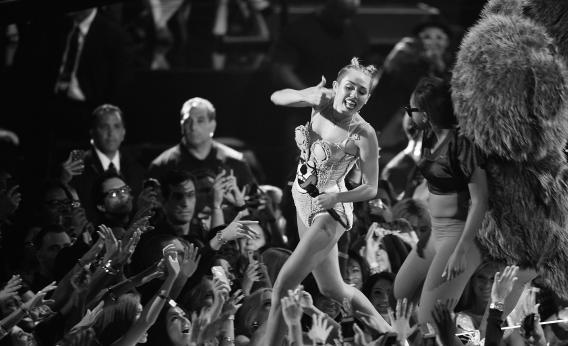Perfect lexicographical storms don’t come along very often. On Aug. 25, Miley Cyrus egregiously “twerked” at MTV’s Video Music Awards, in a performance that quickly became National Conversation No. 1 (even outpacing Syria). About 48 hours later, Oxford Dictionaries announced its quarterly update of new words, and lo and behold, there was twerk, defined as a verb meaning “dance to popular music in a sexually provocative manner involving thrusting hip movements and a low, squatting stance.”
Reactions to the Oxford Dictionaries list were in many ways predictable: along with twerk, the healthy smattering of social-media-friendly lingo (selfie, srsly, vom, apols, squee, etc.) led many to complain that Oxford’s lexicographers seem overly youth-obsessed—even though youth slang is the obvious source for much of our lexical innovation, like it or not.
And there was the inevitable confusion between Oxford Dictionaries Online, where these additions appear, and the Oxford English Dictionary, which isn’t so concerned with the latest neologisms. ODO has its own explanation of the difference, but the media needs constant reminders: the Atlantic Wire and Slate’s Brow Beat blog supplied correctives this time around, just as Brow Beat did last month when ODO’s revision of the definition for marriage was misattributed to the OED. (Disclaimer: I used to be editor for American dictionaries at Oxford University Press and was tasked with explaining these distinctions on a near-daily basis.)
Another common misconception: Oxford Dictionaries added an entry for twerk as a direct response to the Miley Cyrus brouhaha. Katherine Connor Martin, the current head of U.S. dictionaries at OUP, patiently explained that the entry was planned months ago, and in any case, twerking has been around for two decades—originating in the New Orleans “bounce” scene around the time that Miley was born.
But the most typical reaction to the Oxford announcement was encapsulated in the Esquire headline, “Embarrassing News of the Day: ‘Twerk’ Is Now a Real Word.” Once again lexicographers are popularly perceived as the ceremonial arbiters of “real words,” as if twerk had existed in some non-word limbo until Oxford’s gatekeepers magically anointed it with lexical status. I had occasion to poke holes in this mythical view in a New York Times op-ed piece last year about the public preoccupation with lexicographical controversies. Thinking of lexicographers (especially stuffy Oxonians) as a hush-hush word-officiating cabal works well comedically—witness how The Sarah Silverman Program imagined the OED’s Word Induction Ceremony. This time around, we have the Atlantic’s Derek Thompson satirically working all the items from the new-word list into a fictitious memo from the “Word Selection Committee of the Oxford Dictionary.”
There’s extra comedic potential when these supposedly staid lexicographers deliberate over “embarrassing” slang like twerk. I’m reminded of reports in 2006 that Beyoncé was “embarrassed” by the inclusion of bootylicious in the OED. “I wish there was another word I could have come up with if I was going to have a word in the dictionary,” she’s quoted as saying in Britain’s TV Hits magazine. As I wrote at the time, Beyoncé didn’t in fact coin bootylicious, and –licious has been gregariously attaching itself to words for many decades now. But why shouldn’t earthy slang terms like twerk and bootylicious, no matter how squeamishly handled in contemporary body politics, receive dictionary treatment?
When considered lexicographically, a word like twerk can tell an interesting story. As mentioned, it started out in New Orleans c. 1993, when bounce-music anthems like DJ Jubilee’s “Do the Jubilee All” exhorted listeners to twerk. The ODO entry sensibly suggests that twerk is an alteration of work, as in “work it,” and Oxford etymologist Anatoly Liberman has further suggested that the tw– form is influenced by twitch or twist. That seems more likely than a straight-up blend of twist and jerk, as some have conjectured, and certainly more plausible than the theory that it is a clipped form of footwork. (On Twitter, several wags took the etymologizing to more absurd levels, deriving twerk from German Gesamtkunstwerk, meaning “total work of art.”)
I’m predisposed to care about such neologisms, since among other things I’m chair of the New Words Committee of the American Dialect Society, which selects a Word of the Year at its annual meeting. Some are already anticipating/dreading the prospect of twerk achieving WOTY status for 2013. I can’t predict whether that will happen (though it seems like it should at least be a shoo-in to win one of the lesser categories, like Most Outrageous). But if it does indeed get picked as Word of the Year, you can expect a fresh chorus of wails condemning the debasement of the language.
A version of this post originally appeared on Language Log.
